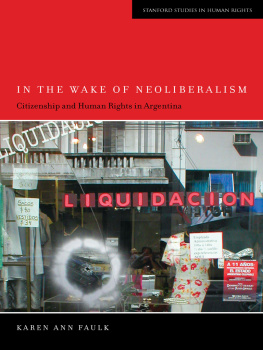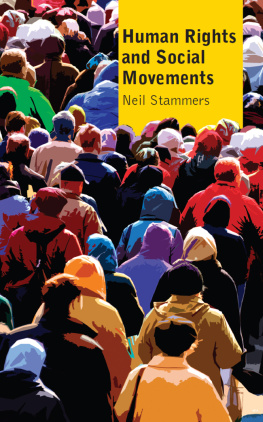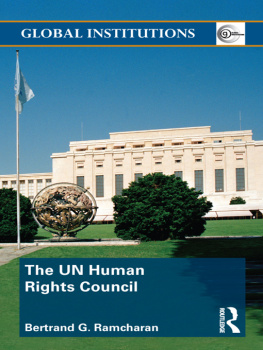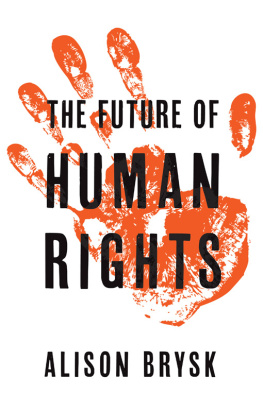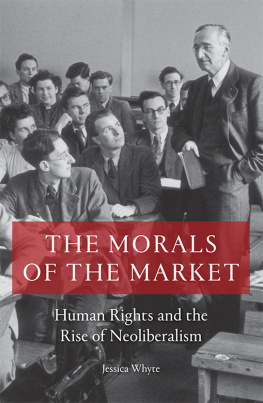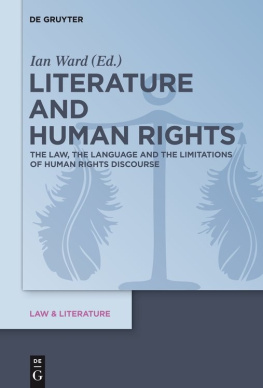Stanford Studies in Human Rights
In the Wake of Neoliberalism
Citizenship and Human Rights in Argentina
Karen Ann Faulk
Stanford University Press
Stanford, California
Stanford University Press
Stanford, California
2013 by the Board of Trustees of the Leland Stanford Junior University.
All rights reserved.
No part of this book may be reproduced or transmitted in any form or by any means, electronic or mechanical, including photocopying and recording, or in any information storage or retrieval system without the prior written permission of Stanford University Press.
Printed in the United States of America on acid-free, archival-quality paper
Library of Congress Cataloging-in-Publication Data
Faulk, Karen Ann, 1976-author.
In the wake of neoliberalism : citizenship and human rights in Argentina / Karen Ann Faulk.
pages cm.--(Stanford studies in human rights)
Includes bibliographical references and index.
ISBN 978-0-8047-8225-8 (cloth : alk. paper)--ISBN 978-0-8047-8226-5 (pbk. : alk. paper)
ISBN 978-0-8047-8391-0 (e-book)
1. Human rights--Argentina. 2. Political rights--Argentina. 3. Neoliberalism--Argentina. 4. Argentina--Politics and government--1983-2002. I. Title. II. Series: Stanford studies in human rights.
JC599.A7F38 2012
323.0982--dc23 2012021909
Typeset by Bruce Lundquist in 10/14 Minion Pro
In memoriam Fernando Coronil (19442011)
Contents
Mark Goodale
Foreword
Karen Faulks In the Wake of Neoliberalism is a compelling argument for how necessary critical ethnographies of human rights have become in broader debates over the relationship between international law and national politics, the changing nature of sovereignty after the end of the Cold War, and the limits of cosmopolitan ethics within grounded struggles over legacies of atrocity and its aftermath. Her book shows the value in responding to these key problems of our time from the inside out, in terms of the lives, reflections, and commitments of people who find themselveswillingly or noton the normative frontlines in what has become a destabilizing moment of ambiguity and historical paradox. The triumph of human rights as a language of political change and moral protest over the last twenty-five years is grounded in a globalized ideology of human fulfillment and cultural evolution that has shaped the contours of resistance and provided a discursive toolkit that has proven to be remarkably versatile across a wide range of cultural, political, and legal vernaculars. But at the same time, underlying political economic vulnerabilities and multi-scalar structures of inequality have resisted the final coming of what Mary Ann Glendon called a world made newa world remade under the sign of radical human equality protected in both form and spirit by laws.
Faulks book is a carefully wrought study of these currents of ambiguity as they have swirled in and around Argentina over several decades. During this time, the experience and history of Argentina have become an iconic part of the story of human rights, from the images of the intrepid Mothers of the Plaza de Mayo holding vigil and demanding justice for the crimes committed by the military junta against their sons and daughters, to the more recent high-profile role played by a former Argentine lawyer as the first Chief Prosecutor of the International Criminal Court. Argentina has become one of the global touchstones for evaluating the promise and limitations of human rightsas a politico-legal mechanism for protection and redress, as a moral grammar with transcultural aspirations, and as a rallying cry for revolutionaries facing down the last authoritarian holdouts within what James Ferguson has called the neoliberal world order. Faulk parses these multiple dimensions of human rights and develops a theoretical framework that allows us to both appreciate and critically bracket the legacy of rights-claiming within contemporary Argentina.
Her book focuses on a key dynamic in this broader narrative of human rights in Argentina: the appearance of discursive and political fault lines when the logics of human rights were taken up beyond the political and social processes through which Argentine society struggled to come to terms with the Dirty War and its aftermath. Throughout the 1990s, as in other countries of Latin America, the Argentine political economy was restructured under the careful eye of the World Bank and the International Monetary Fund, which sought a hemispheric consensus on a specific economic and political model as a precondition for loan-making and the formation of new regional economies. As Faulk shows us, it was during this consolidation of neoliberalism in Argentina that human rights underwent a consequential shift in both meaning and application. She argues that the role of human rights was transformed when the strategy of right-claiming was broadened beyond the process of holding high-ranking officials to account for crimes against humanity. After civilian rule had been firmly established, Argentines thoroughly infused by a culture of human rights looked beyond torture and disappearance to other symbols of transgression.
They found them in violations not against physical integrity such as those that had accompanied the dictatorship-era political repression, but in those against the nature of the neoliberal subject itself. If the neoliberal subject was meant to be an autonomous agent, accountable for actions under law, and equal in access to opportunities, then corruption and impunity are markers of a failure by the state to create the conditions in which neoliberal subjectivity-as-citizenship can adequately flourish. Faulk uses an ethnography of two organizationsMemoria Activa and Cooperativa BAUENto demonstrate how the struggle to hold the state accountable for its failures led to new understandings of human rights themselves, as activists eventually reframed the implications of corruption and impunity beyond the neoliberal subject to encompass a collective account of well-being. The dialogical analytics that Faulk develops to understand this slippage toward an innovative human rights vernacular in Argentina reveals, as she puts it, the mutually constitutive processes that link the language of rights, neoliberalist policies, and institutions of democracy, both in their philosophical premises and actual lived expression.
Mark Goodale
Series Editor
Stanford Studies in Human Rights
Acknowledgments
Thinking about all of those who have made this book possible is a monumental task. This project has been, in a multitude of ways, a collective effort. To mention those who have supported, accompanied, put up with, and challenged me in the long years of research and writing that went into this book is woefully insufficient in recognizing their role in the making of this project. Their efforts are woven into every page. Making explicit their names here is only a gesture toward recognition of their otherwise implicit but no less essential presence in the text.
My intellectual mentors, while of course not responsible for the failings of this work, are undeniably responsible for its strengths. Mark Goodale had the generosity to provide both insight and oversight in turning the book into a reality. I will be forever grateful for the brilliant care and support that Jennifer Robertson, Fernando Coronil, and Julie Skurski have offered me over the years. Many people have read, listened to, and commented on the chapters of this book or earlier versions. Noa Vaisman accompanied every step, and always understood what I meant, even better than I did. She and Leticia Barrera were always there to calm my doubts and refine my understanding. How many scholars can truly count themselves as lucky, able to send a rushed email with a question on the finer details of Argentine constitutional law and receive a detailed and accurate response from two such generous and capable experts (with relevant pdfs attached) in less than nine hours? Carlos Forment, Daniel Goldstein, and Sian Lazar were wonderfully incisive critical readers whose comments invariably pushed me to take it one step further. Kairos Marquardt heard me out, over and over again, lightening my mind and my heart with her generous ability to listen. Javier Auyero, Jos Blumenfeld, Sarah Muir, Michelle Cohen, Natasha Zaretsky, Mariano Perelman, Julia Paley, Carol Bardenstein, Michael Fisch, and the participants in the Legal Subjectivity, Popular/Community Justice, and Human Rights in Latin America conference at the Centre for Research in the Arts, Social Sciences and Humanities of the University of Cambridge all provided valuable feedback on portions of the text along the way. I am also obliged to the Departments of Anthropology at the University of Pittsburgh, the University of New Mexico, Marshall University, and CUNYStaten Island for graciously inviting me to present portions of this research. I am very grateful to Kate Wahl, Joa Suorez, and Clementine Breslin at Stanford University Press for their careful and consistent efforts. Richard Gunde was a fantastically thorough and well-informed editor. My thanks go as well to my family, in the broadest of senses.
Next page
